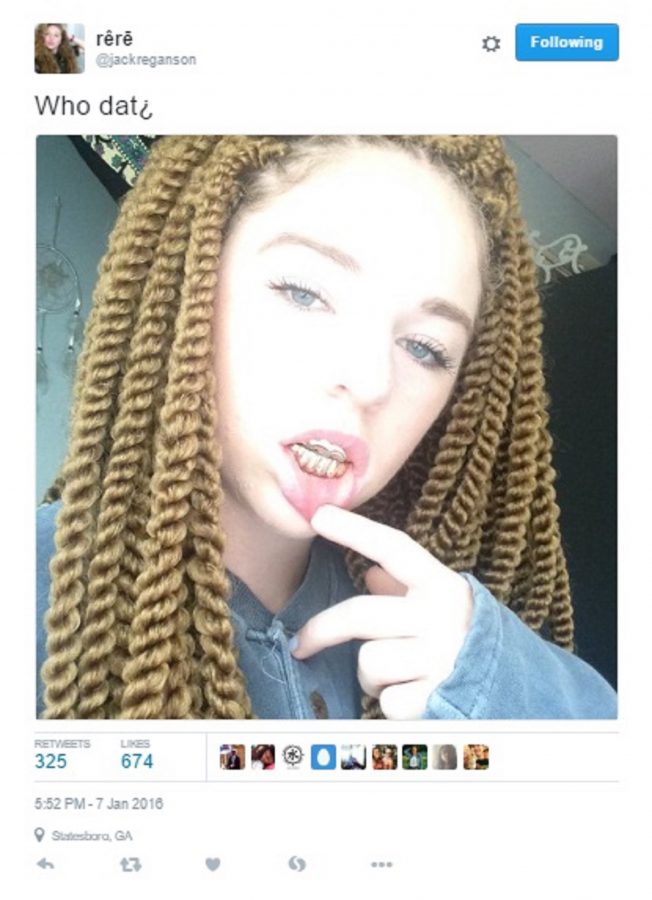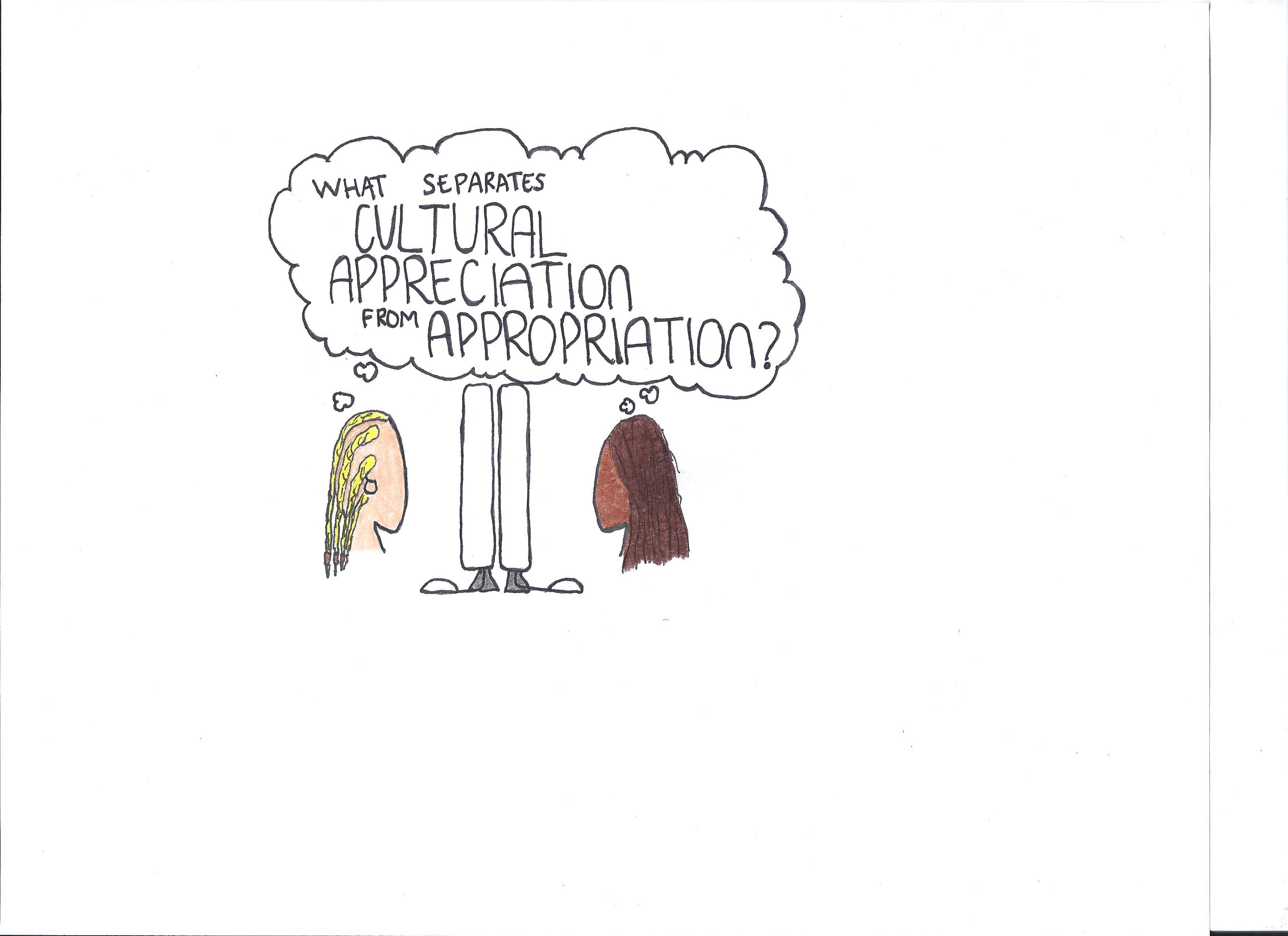Your donation will support the student journalists of North Cobb High School. Your contribution will allow us to purchase equipment and cover our annual website hosting costs.
“Why aren’t you ghetto?”: Jackson balances cultural appropriation tightrope
May 12, 2016
Before graduating from NC in 2015, Regan Jackson appeared on several homecoming and prom courts, received the Miss North Cobb superlative, and won the Atlanta Journal Constitution cup for Best All Around Senior. Such indisputable popularity contributed to Warriors’ surprise upon finding Jackson, now attending Georgia Southern University, in the midst of a Twitter scandal on January 7, 2016. Why did Jackson receive hundreds of retweets and responses to a picture that she expected to gain miniscule notice from her followers?
“I started looking at [the notifications] … and it was weird because you know they were strangers, this has never happened to me before,” Jackson said,
On January 7, the NC alum posted a picture of herself donning box braids and a faux gold grill with the caption, “Who dat¿” Jackson maintains she meant no harm in posting the picture, explaining, “I was posting it for my friends, showing you guys know who I am and here I am looking so different.”

Jackson tweeted this photo in hopes of showing her followers who she really is. She did not expect the tweet to go viral, nor to be front and center in the face of controversy.
In the initial days following her post, the tweet received a normal level of feedback from close friends. On the third day, however, Jackson awoke to a flood of notifications as people began interacting heavily with the tweeted picture.
Reading the responses to her picture, many of which contained insults and accusations, Jackson experienced confusion over the situation. She sat in her room reading the tweets.
“[I was] thinking ‘should I start crying?’” Jackson said.
Before Jackson grew angry or hurt by the strangers’ tweets, she received confirmation texts from countless friends assuring her she did nothing wrong. Still, hundreds of Twitter users, including several NC students, felt Jackson’s post misused cultural items and mocked African American culture.
NC sophomores Chloe Roberson and Nadya Awino felt Jackson overstepped acceptable social boundaries and committed cultural appropriation through her January 7 tweet.
Delving into why the tweet offended them, Awino said, “it’s the fact that [Jackson] got to use our culture as a fashion statement.”
Roberson saw a double standard in the praise Jackson received from friends and supporters for trying a traditionally African American hair style because she recalled specific instances when changes to her own hair earned her no such praise. Similar experiences drove Awino to stop styling her hair in cornrows to discourage individuals from pulling on her hair or suggesting her braided skull resembled a boy’s.
On top of receiving revolutionary feedback for an African American hairstyle, Roberson and Awino felt Jackson’s grill embodied stereotypes from which their culture cannot separate itself.
Feeling bothered by the popularity of another picture reinforcing the stereotype, Roberson said, “That’s not even the right portrayal because not all of us are like that.”
Beyond the stereotypical implications, Awino claimed Jackson’s picture mocked actual cultures whose box braids and grills do not constitute costumes.
Awino explains the photo’s unwitting depiction of actual social groups: “When people who actually live in like lower income communities have box braids and grills like that, you call them ghetto and you call them hood. So why aren’t you ghetto, why aren’t you hood?”
The two NC sophomores voiced opinions shared by other Twitter users who witnessed Jackson’s post. Outraged responses to the tweet ranged from accusations of cultural appropriation and intentional disrespect to insults slamming Jackson’s physical appearance and likening her hair to “curtain tassels.”
Jackson did not dismiss the comments, no matter how hurtful they became. At the center of an unexpected Twitter controversy, she read through each response to consider if any accusations pointed out valid wrongdoings on her part.
The NC alum felt the issue’s core lay in the lack of context Twitter provided viewers regarding her character and intentions.
“I did feel badly and that kind of sucks, like I understand where they’re coming from feeling this way and that [way],” Jackson said.
Definite truth exists in Jackson’s conclusion that people who felt she appropriated culture did not know her true self. Beyond the countless texts and tweets assuring Jackson that “haters just don’t know who [she is],” the recent spike in use of the term cultural appropriation corresponds with the explosion of social media usage.
No matter how innocent Jackson’s intentions or how deep her knowledge of African American culture extends, Roberson and Awino could not see those features when witnessing the viral tweet. The two sophomores witnessed a girl, known to them only as a former NC superstar, achieve over 600 likes on a picture they felt mocked their ethnicity and robbed their culture of recognition.
For Roberson, the box braids Jackson tried for a picture are not a whimsical choice. Roberson explains that the various styles black women exhibit do not result from fashion preferences, but serve to “protect [their] hair because [their] hair gets really damaged sometimes because like Caucasian hair is a different texture [than African American].”
Social media’s impersonal, decontextualized format prevented Roberson and Awino from learning that Jackson’s experiences in maintaining the box braids enlightened her to black women’s daily hair maintenance difficulties.
Explaining the expansive effect of trying African American hairstyles, Jackson said, “I am the one to look at a black girl with a different hairstyle and appreciate them and like them because I understand the different hassles that come with different hairstyles and what comes with managing your hair.”
Hearing about the sophomore girls’ experiences with people petting their hair or asking insensitive questions, Jackson wrinkled her face in disgust. Twitter’s 140 character limit does not allow room for Awino, Roberson, and others insulted by the January 7 tweet to witness Jackson’s unceasing dedication to close the gap between other cultures and her own.
When discussing potential solutions to the increasing issue of cultural appropriation conflicts, Awino and Roberson unknowingly agreed with Jackson. All three women feel insensitivity will never diminish without intentional, society-wide efforts to increase awareness about the cultural significance behind commonly appropriated objects and symbols.
Roberson describes the importance of learning the meaning and history behind cultural trends and fashions, explaining that appropriation occurs when people adopt trends from traditionally oppressed cultures without learning the entire histories behind them.
Citing the injustice in the lower income community overtones of Jackson’s post, Roberson questions, “Why just take [the culture] for a day and not have to live out the whole thing?”
Reflecting on the implications of increasing public awareness about cultural significances, Jackson feels such dialogue could turn borrowing from other cultures into a positive phenomenon. The NC alum explains that if people chose to learn the significance of Native American tribal headdresses and teach such history to friends while donning one as spirit wear at a sporting event, cultural mixing would lead to increased cultural awareness and sensitivity.
Although Awino shares Jackson’s sentiment that people need to increase their efforts to learn about other cultures, the sophomore feels it best if individuals view other cultures’ symbols and trends as off limits. Awino feels, for example, that white women should appreciate the maintenance and necessity behind black women’s hairstyles, but they should not join in on the styles because they suddenly feel such looks conform to current fashion trends. The NC sophomore sees such mixing as unnecessary overstepping on the part of white women: “Like, you already have privilege, you’re the beauty standard. Why, when we create something, you wanna join in all of a sudden?”

